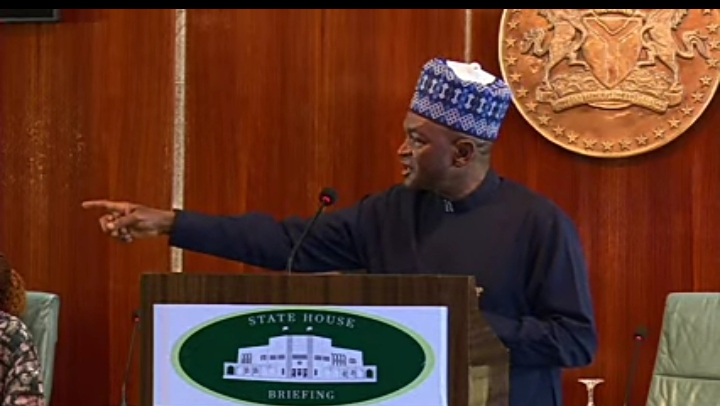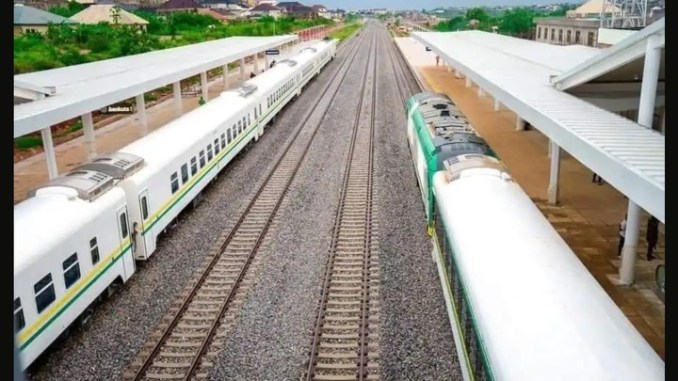NIGERIA: How Ukraine war, COVID-19, local insecurity caused high price of food, Agric Minister reveals

*As FG told ‘middlemen, hoodlums activities’ make list of threats to food security
*Reason drop in inflation rate brings no positive indicator to reality on ground – Concerned Citizens
*Say basic food needs dollar being used to determine are made in Nigeria, want checks, monitoring, control
By KEMI KASUMU
The Minister of Agriculture and Rural Development in Nigeria, Malam Mohammed Abubakar, has identified COVID-19, Russian-Ukraine war and insecurity in some parts of the country are threats to the agricultural sector leading to high cost of food in the country.

He spoke leaving out the issue of artificial creation of scarcity and indiscriminate increase in prices of food due to activities of marketers/middlemen/hoodlums in especially Lagos State, a federating unit’s economy upon which all states’ economies in the country depend, and which make salaries of Nigerian workers inadequate, even since when those three reasons he listed were not around.
Minister Abubakar, however, mentioned what the government is doing to mitigate the effects, adding that the short-term mitigation measures and medium-term plans of the Muhammadu Buhari’s Administration are yielding the desired results.
Noting that the agricultural sector is people based, he also disclosed that the ministry was adopting a multi-stakeholder approach in designing and implementing its mandate, with enhanced private sector involvement in agriculture and sustained efforts to reduce drudgery and enhance value addition.
Nigeria can deepen the production of its basic food requirements and create more jobs in the process, the Minister said.
He said that Nigeria was targeting over $600m from its resumed export of Hibiscus flowers (Zoborodo) to Mexico.
Malam Mohammed Abubakar, the Minister of Agriculture and Rural Development, while speaking at a Presidential Media Briefing in Abuja, on Thursday August 4, 2022, said 15 containers of the natural product valued at $35 million were already on their way to Mexico.
He recalled that the product which Nigerians were initially exporting to Mexico was stopped due to trade disputes.
According to him, “the Mexican ambassador was in my office recently and we resolved all the issues around the product export. So, we have resumed the export of Hibiscus flower to Mexico.”
The minister also revealed that Nigeria’s strategic food reserve now stands at 60,000MT of assorted food, in over 17 silos under concession located in various part of the country.
On jobs creation, Abubakar said about 3.6 million indirect jobs have been created from $1.113 billion (about N461.9bn) worth of externally funded projects being implemented by the present administration.
“The government is currently distributing 40,000MT of assorted food commodities approved by President Muhammadu Buhari to vulnerable populace, IDPs, through various groups, across the country.
“Under the strategic food security programmes, the minister said the construction of 100,000MT silo project is nearing completion in Ado Ekiti while another 25,000MT silos will soon be completed at Igbariam, in Anambra State.
He said $538 million was approved for special agricultural processing zones to support inclusive and sustainable agricultural development in Nigeria.
According to him, another project worth $575 million is being implemented to improve rural access and agricultural marketing in participating states while strengthening the financing institutional base for effective development, maintenance and management of rural roads network.
He listed the participating states as Akwa Ibom, Bauchi, Kano, Katsina, Kogi, Kwara, Kebbi, Ogun, Ondo, Oyo, Plateau and Sokoto. The minister noted that government is also implementing the Value Chain Development Programme
Additional Financing (VCDP-AF) 2020- 2024 to enhance, on a sustainable basis, incomes and food security of poor rural households engaged in the production, processing and marketing of rice and cassava.
He revealed that the project is currently being implemented in nine states, including Niger, Benue, Ogun, Ebonyi, Taraba and Anambra, Nasarawa, Kogi and Enugu “to scale up the achievement recorded in the original VCDP states.”
He assured that government commitment to developing the agricultural sector is not in doubt.
“Even though COVID-19, Russian-Ukraine war and insecurity in some parts of the country are posing a threat to the agricultural sector, the short-term mitigation measures and medium-term plans of the government are yielding the desired results.”
The success of any agricultural policy and interventions, however, rests on synergy among Federal MDAs, and between Federal, states and Local governments.
“Nigeria is not immune from the current situation in Europe. It is my hope that the recent agreement between UN, Turkey Russia, and Ukraine on the export of grains through the Black Sea Ports of Ukraine will lead to a drop in the price of grains in the international market, which will in turn ease the inflationary trend on the price of food in the country,” the minister said.
Tackle activities of middlemen, hoodlums in market, transport sectors, FG told
The DEFENDER reports that activities of middlemen, who hoard food to inflict economic pains on average citizen either in the paid or self Ade employment sector, and of hoodlums, believed to be working for powerful politicians especially in Lagos State, are a major part of the reasons even when COVID-19, war in Ukraine and insecurity were not around, earnings of citizens have been unable to take them home.
A respondent, who spoke about food scarcity while appreciating the Federal Government, said, “However, let the government do more by asserting itself. Sometimes when I hear them talking about COVID-19, war in Ukraine and insecurity as a major cause, I want to disagree in the sense that, it is glaring the hardship we suffer comes from Lagos.”
How? The respondent, who strictly demanded for his identity not to be disclosed said, “Maybe you do not know that economy of Lagos determines the success or failure of economies of other states in Nigeria. What has the Federal Government done to monitor how the food items produced from its multi-billion dollar agricultural programmes are being distributed to the markets from that state that truly has been the economic nerve centre of the following?”
He continued, “So long the Federal Government does not do anything monitoring the supply chain from the point of milling, in terms of rice production, through the transportation as to what impediments transporters of those food items face on the roads, to the warehouses in Lagos/Ogun axis namely Daleko, Iddo markets in Lagos and Sango Ota market in Ogun and so on and so forth, there will continue to be problem and hardship.
“So long the FG does not monitor to know, after delivering to those major marketers or warehouses, how the retailers fare accessing the items for further sales to the final point in the value chain that is consumers, so long the Federal Government does nothing here and even control prices, let minimum wage be N1 million per month, its good intention and efforts to boost food security either through import or local production, will never be allowed by those elements and enemies of progress and development to work, and what you will have is people continue to tag the President and his team as failure,” he said.
He gave some explanations. “In Lagos, time majority of the workers had salary increase last is three years now and some do not even have increase at all. There are employees in Lagos till now, who monthly pay does not pass N10,000 pe month with no allowances. Public workers? Minimum wage done by Buhari was over five years previous administration failed to do it and even the N30,000 minimum wage he has done, some state governments sabotage as they turn it to tool of politics which they announce as election approaches. Not all states have effected it.
“Yet, the Agbero in Lagos have increased transportation fares of those workers for more than tolerable times. I’m Lagos you have marketers who increase prices at hearing of dollar rise but refuse to reduce such prices when dollar falls to Naira. All the food items those marketers use foreign exchange to determine their prices are locally grown, example, rice, beans, yam, garri, elubo, maize, millet, processed food like semovita and family, noodles, spaghetti, and so on and so forth.
“Same thing is the activities of petroleum marketers as they affect food prices in the market. This in the sense that hoarding of petrol by independent marketers outlets lead to fuel scarcity and then artificial fuel pump price increase. There are many major marketers who sell at normal price but, sadly, transporters that but at major marketers filling stations mischiously choose to claim the price of independent marketers and then increase transportation fares based on that. This is more across the South especially South West.
“Imagine that a worker, who finds himself in this tight corner and uncontrolled situation, now board commuter bus with fear of unstable charges. How do you expect that workers who cannot afford the high cost of rent in, for instance Ikeja and is therefore living I Sango-Ota, Alagbado, Iju Ishaga, Ikoyun, Agbara, will survive on minimum wage of N30,000 in a situation that Agbero have increased transportation fares for example from N150 Alagbado-Oshodi, Ikotun-Ikeja when the minimum wage was signed to now between N400 and N500 to work alone. Depending on crowd at bus stop, it does goes higher to N600 and N1,000 while returning.
“Same way transporters of food items complain about the effects of activities of these same Agbero and hoodlums of Lagos. One woman was on a radio station in Lagos she said as marketers who bring food items from the North, before her trailer could be allowed to offload in the market she mentioned in same Lagos, Agbero who are said to have now extended their activities to the market places demanded for N300,000 and that she paid but asked: “Where do you think I will get that N300,000 back? By now having to double my price of course!”
“The woman spoke while saying people should stop thinking that food prices hike or hardship in Nigeria was because government did not produce or let enough food into the market. No. Lagos is the reason for the hardship of Nigeria and this hardship is caused by what happened to the market and transportation sector. Are there no governors in Lagos? Why are we shouting the name of the President and Federal Government for problems caused by governors and state governments who refuse to let the Local Governments function, despite that the Federal Government signed Executive Order to this effect?
“By law, market and motor parks are under the Local Government Administration but at states, they are under hoodlums godfathered by state run politicians who are also protected by constitutional security agents. How will Nigeria not be hard for Nigerians? That is why no mater millions of metric tonnes of grains released by Federal Government to the markets, you will continue to hear ‘hunger in the land’ and there is truly hunger in the land. Something must be done fast,” he said.








